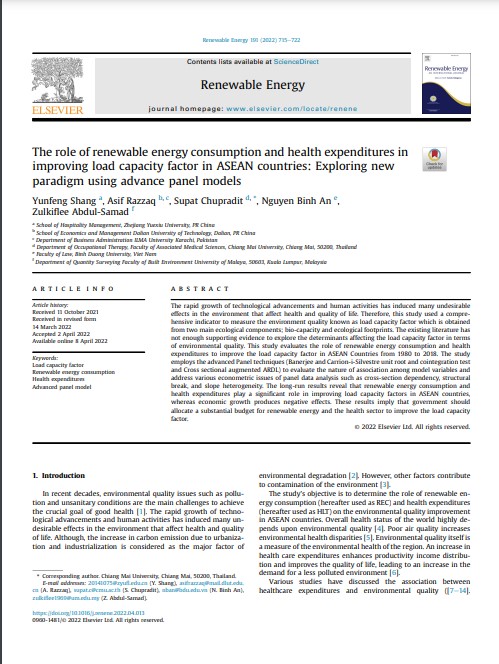
Keyword(s)
Author(s)
a) Yunfeng Shang, b,c) Asif Razzaq, d) Supat Chupradit, e) Nguyen Binh An, f) Zulkiflee Abdul-Samad
Country(ies)
Publisher
Published Date
Access
DOI
The rapid growth of technological advancements and human activities has induced many undesirable effects in the environment that affect health and quality of life. Therefore, this study used a comprehensive indicator to measure thThe rapid growth of technological advancements and human activities has induced many undesirable effects in the environment that affect health and quality of life. Therefore, this study used a comprehensive indicator to measure the environment quality known as load capacity factor which is obtained from two main ecological components; bio-capacity and ecological footprints. The existing literature has not enough supporting evidence to explore the determinants affecting the load capacity factor in terms of environmental quality. This study evaluates the role of renewable energy consumption and health expenditures to improve the load capacity factor in ASEAN Countries from 1980 to 2018. The study employs the advanced Panel techniques (Banerjee and Carrion-i-Silvestre unit root and cointegration test and Cross sectional augmented ARDL) to evaluate the nature of association among model variables and address various econometric issues of panel data analysis such as cross-section dependency, structural break, and slope heterogeneity. The long-run results reveal that renewable energy consumption and health expenditures play a significant role in improving load capacity factors in ASEAN countries, whereas economic growth produces negative effects. These results imply that government should allocate a substantial budget for renewable energy and the health sector to improve the load capacity factor.e environment quality known as load capacity factor which is obtained from two main ecological components; bio-capacity and ecological footprints. The existing literature has not enough supporting evidence to explore the determinants affecting the load capacity factor in terms of environmental quality. This study evaluates the role of renewable energy consumption and health expenditures to improve the load capacity factor in ASEAN Countries from 1980 to 2018. The study employs the advanced Panel techniques (Banerjee and Carrion-i-Silvestre unit root and cointegration test and Cross sectional augmented ARDL) to evaluate the nature of association among model variables and address various econometric issues of panel data analysis such as cross-section dependency, structural break, and slope heterogeneity. The long-run results reveal that renewable energy consumption and health expenditures play a significant role in improving load capacity factors in ASEAN countries, whereas economic growth produces negative effects. These results imply that government should allocate a substantial budget for renewable energy and the health sector to improve the load capacity factor.